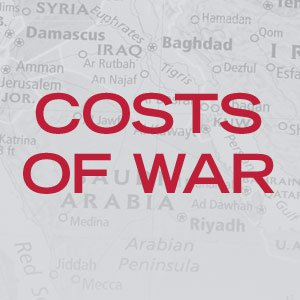The Costs of War: 225,000 Lives, $4 Trillion And Climbing
By aaroncynic in News on Jun 30, 2011 1:30PM
 Since 9/11, U.S. actions in Iraq, Afghanistan and Pakistan cost at least a quarter of a million lives and will likely reach more than $4 trillion, a new research project reports. The Costs of War by Brown University’s Watson Institute for International Studies details the toll the wars have taken in human, economic, social and political costs. Some of the findings include:
Since 9/11, U.S. actions in Iraq, Afghanistan and Pakistan cost at least a quarter of a million lives and will likely reach more than $4 trillion, a new research project reports. The Costs of War by Brown University’s Watson Institute for International Studies details the toll the wars have taken in human, economic, social and political costs. Some of the findings include:- At least 8,300 U.S. Troops and Pentagon contractors have lost their lives and nearly 70,000 allied troops have been wounded. Illinois has lost 161 soldiers in Iraq and 70 in Afghanistan.
- Well over half a million disability claims have been filed with the V.A. As of 2010.
- Overall, at least 225,000 people have been killed and 375,000 wounded in Iraq, Afghanistan, and Pakistan, including civilians and enemy forces.
- Nearly 8 million people have been displaced by the conflicts.
- The economic costs continue to climb past $4 trillion. That figure does not include Medicare costs for injured veterans after age 65, expenses paid by state or local government budgets on veterans, or $5.3 billion for reconstruction aid to Afghanistan.
In purpose, practice and on how to proceed in the future, we’ll let the Costs of War report speak for itself:
However one judges the US waging of the wars in Afghanistan, Iraq, and Pakistan, at the very least, we should know what each of those wars has been like. We should know who has been killed, what kinds of wounds have been suffered, and what kinds of economic costs and consequences have been incurred. Those costs have been consistently minimized, misunderstood, or hidden from public view.